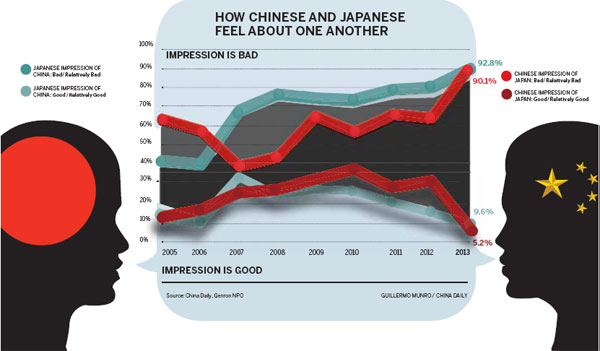
Chinese and Japanese views toward each other hit 9-year low, poll finds
The impasse between Beijing and Tokyo over the Diaoyu Islands has badly hurt the attitude of both peoples toward their neighbor, with nine out of 10 saying they dislike the other nation, a recent survey has found.
Results of the survey, co-sponsored by China Daily and the Japanese nonprofit think tank Genron NPO, are the worst in almost a decade. They are even worse than in 2005, when Japan's then-prime minister Junichiro Koizumi repeatedly visited the Yasukuni Shrine honoring Japan's war dead, including war criminals from World War II.
Despite this mutual aversion, 72 percent of Chinese and 74 percent of Japanese see ties as "important". Corresponding figures in Chinese and Japanese intellectual groups reached 80 percent and 92 percent.
Without a breakthrough in relations, "similar surveys will find people's emotions hitting a new low in the future", said Lyu Yaodong, head of Japanese diplomacy studies at the Chinese Academy of Social Sciences.
With the Japanese government continuing to deny the existence of a dispute over the Diaoyu Islands, there will be little hope for a summit between the two to break the ice, observers said.
The two countries had agreed to put aside issues surrounding the islands as Beijing and Tokyo focused on warming up their political and economic ties over the past four decades. But recent Japanese governments have sought to change the status quo and deny the existence of a dispute, which angered China.
The findings show that 92.8 percent of Chinese surveyed hold a negative attitude toward Japan, 28 percentage points higher than last year. Similarly, 90.1 percent of ordinary Japanese have negative feelings toward China, in contrast to 84.3 percent last year.
Hu Jiping, director of the Institute of Japanese Studies at the China Institutes of Contemporary International Relations, said the neighbors are in urgent need of negotiations to break the ice and stop relations getting worse.
"It is impractical to expect the territorial dispute to be solved completely. We can only agree on provisional arrangements at the moment," Hu said.
